Views: 0
President Yoweri Kaguta Museveni has cautioned Ugandans against using Information And Communications Technology (ICT) to promote importation.
President Yoweri Kaguta Museveni advised Ugandans to use Information and Communications Technology (ICT) to bolster domestic consumption and exports while being cautious about promoting importation.
During his speech at the 2nd Annual National ICT Job Fair 2023 at Kololo Ceremonial Grounds, President Museveni stressed the importance of using ICT to endorse the purchase of goods and services within Uganda and selling to other countries. He highlighted the concern that using ICT to promote importation could have detrimental effects on the nation’s economy.

President Yoweri Kaguta Museveni launching the 2nd Annual National ICT Job fair 2023 at the Kololo Ceremonial grounds on 17th October 2023.
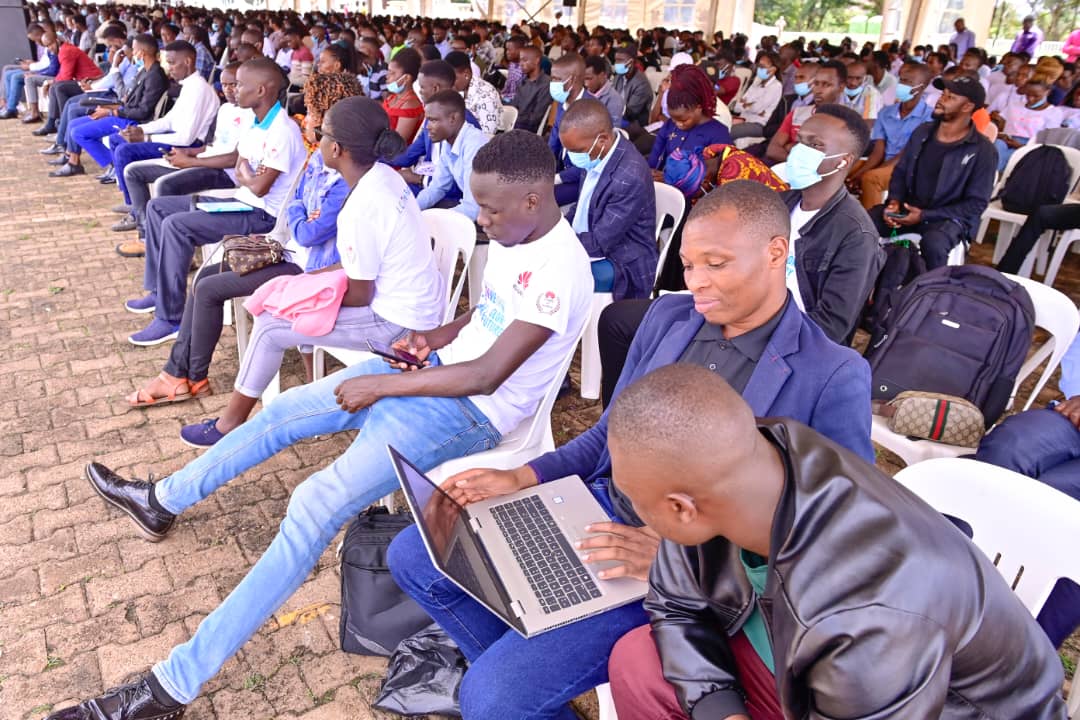
The youths in attendance.
Job Fair 2023-Dr. Baryomunsi’s Remarks
President Museveni said Ugandans should use the ICT to promote buying of goods and services within Uganda or promote selling to outsiders but not vice versa.


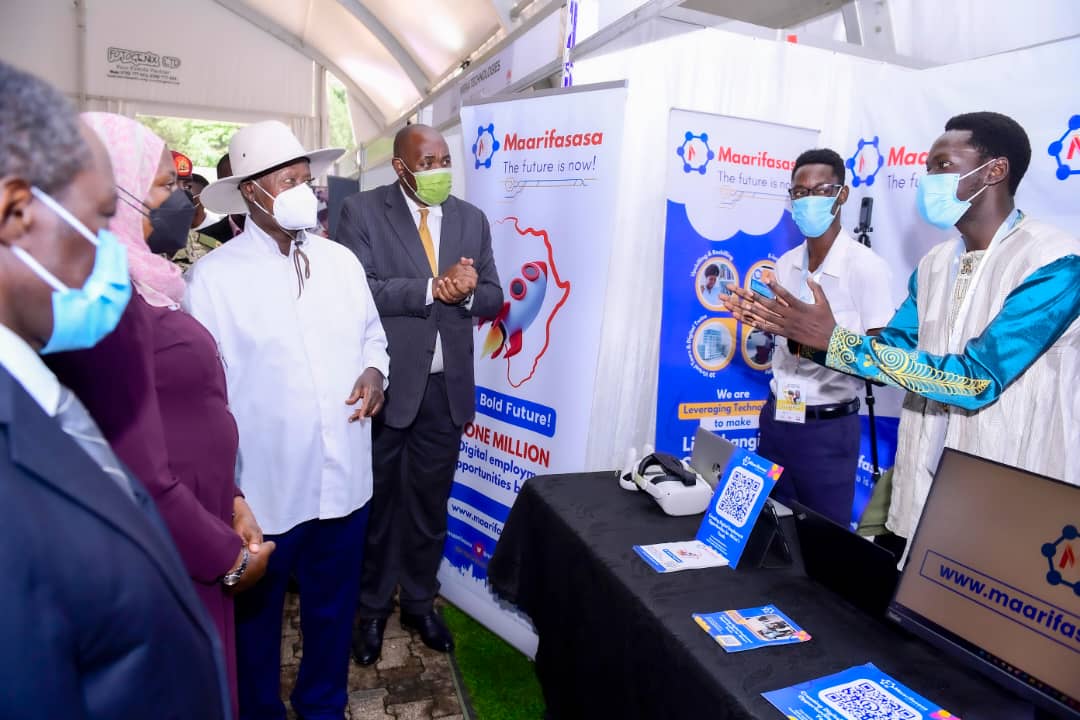
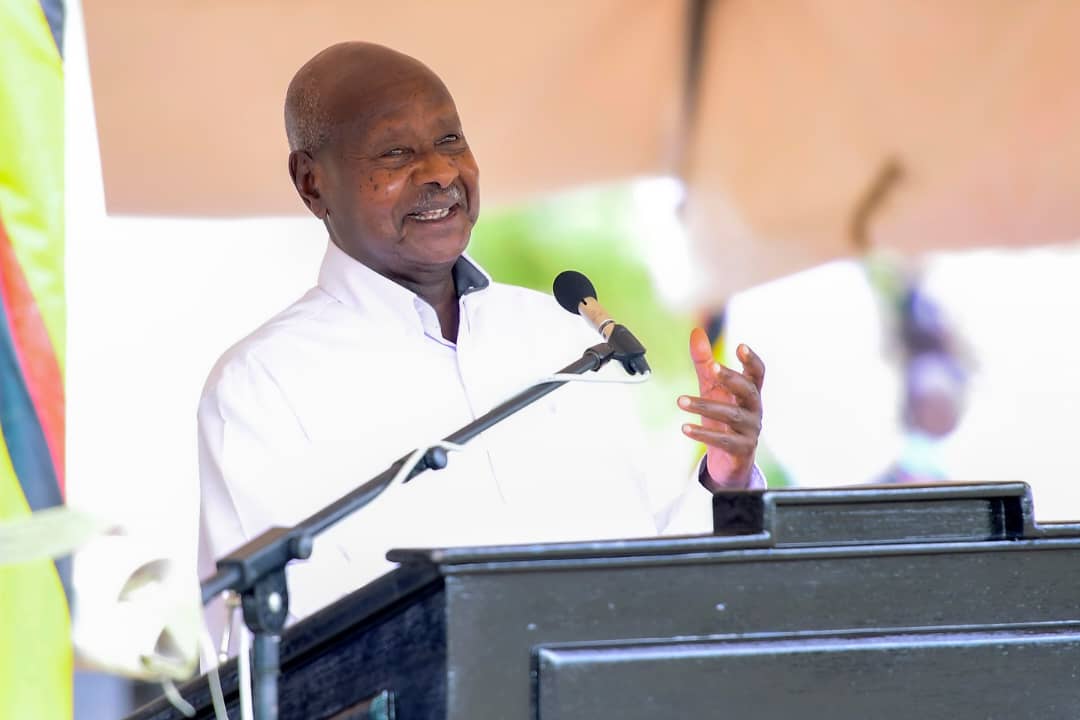
Uganda’s President H.E Yoweri Kaguta Museveni
Uganda’s President H.E Yoweri Kaguta Museveni inspecting the exhibition of National Water and Sewerage Corporation.
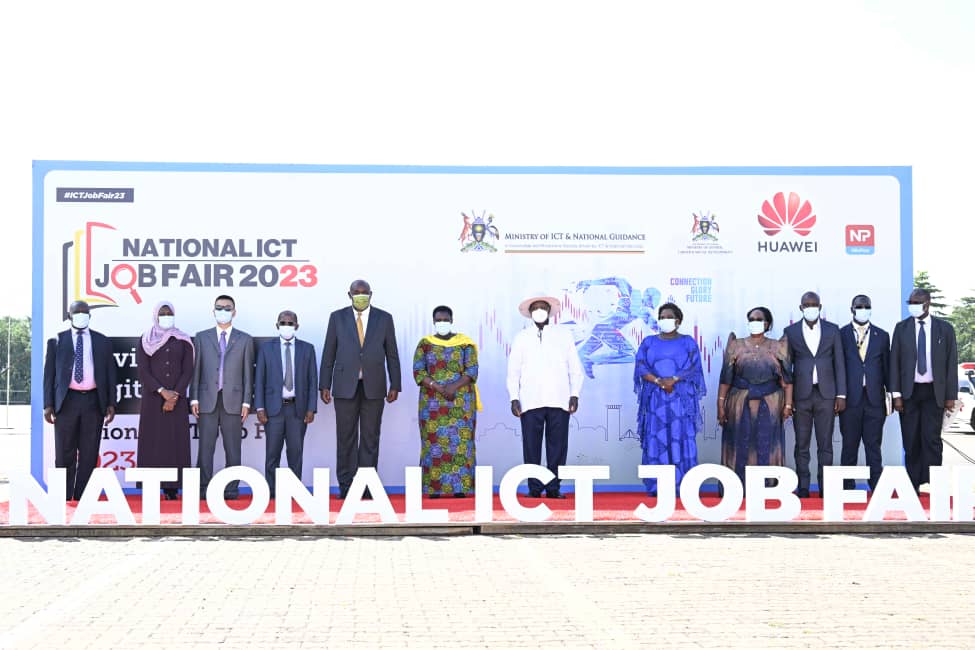
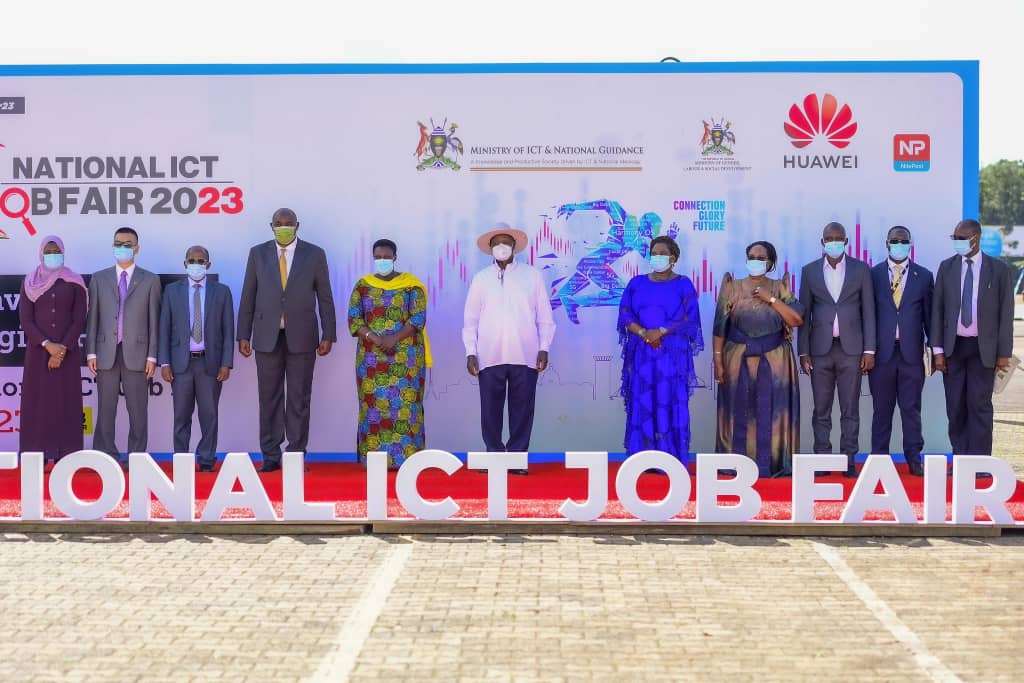
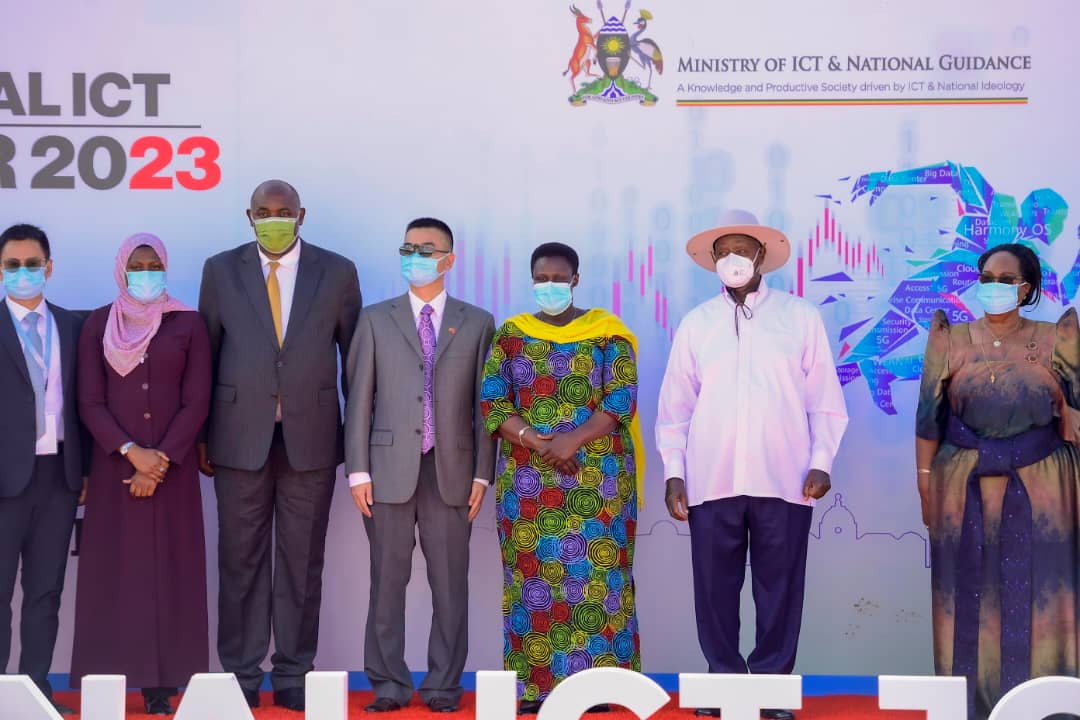
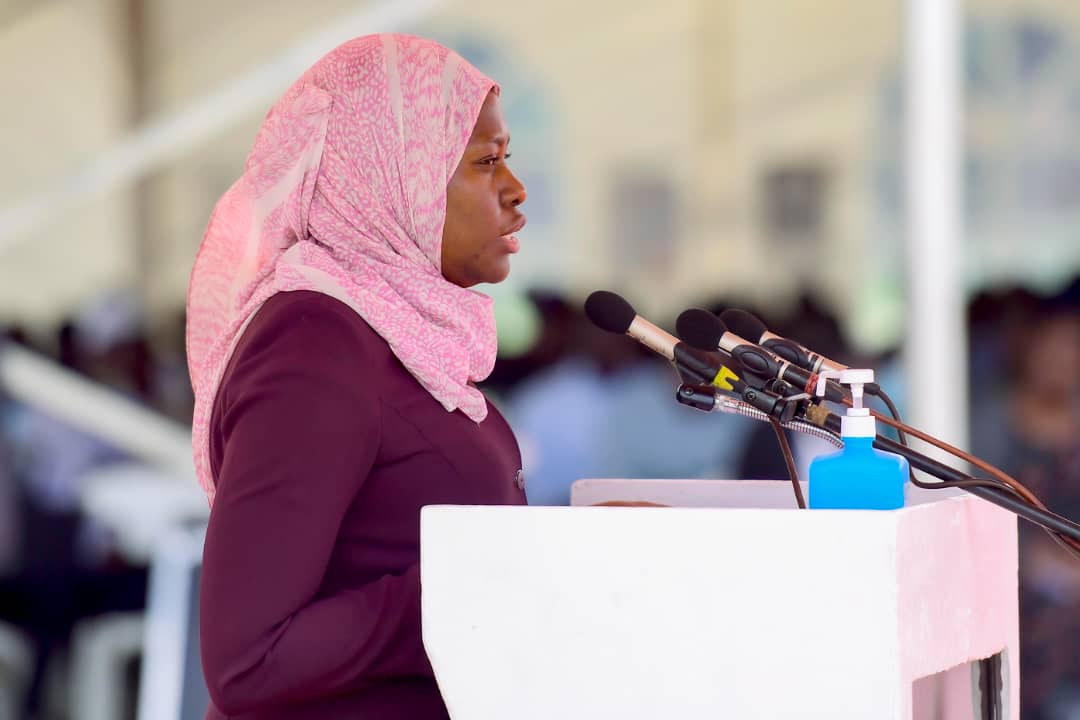
Dr. Aminah Zawedde, the Permanent Secretary of Ministry of ICT and National Guidance delivering her remarks.
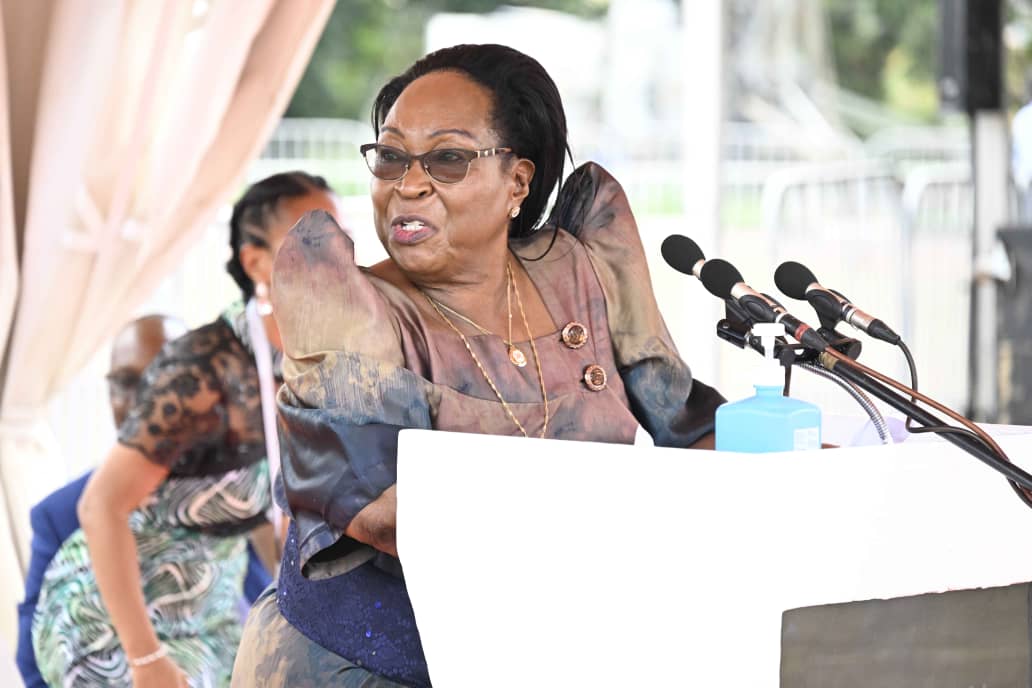
Minister of State for Information, Communications and Technology Owek.Joyce Sebugwawo
“According to Kariisa of NBS, I can now use my followers on social media to advertise and then I’m paid but now the question is, whose products are you advertising? Are you advertising Uganda’s products or are you trying to convert Ugandans into importers? This ICT of yours, what is it being used for? Is it being used to promote importation? If you are promoting importation, then you are sucking blood from us and taking it outside,” he said.
The President made the remarks today while officiating at the 2nd Annual National ICT Job Fair 2023 at Kololo Ceremonial Grounds.
Running under the theme: “Navigating the Digital Horizon”, the two-day (17th-18th October, 2023) event organised by the Ministry of ICT and National Guidance in partnership with Huawei Technologies Uganda, serves as a platform to connect employers in the ICT sector with talented job seekers. The event brings together a diverse range of stakeholders, including employers, job seekers, policymakers, and industry experts, thus fostering meaningful networking and collaboration opportunities.
President Museveni explained that ICT is a huge step for the human race but Africa, like all the other scientific innovations, must use it in the right context to build an economy that is independent, integrated, and self-sustaining.
“That is what we told you from 1986 in the 10 point program,” the President said.
“If you integrate your ICT with imports then you are a liability not an asset to the country, the same with the banks, telecom companies like MTN. The talking you make, what are you talking about, are you talking about importing human hair? If that is what you are talking about, then you are a liability. What are telephones used for? Is it to buy or sell? The banks are giving loans, loans for what? For importing or for manufacturing here? Or for internal distribution?” he added.
President Museveni further underscored the vital role of ICT, saying that it makes work faster, more efficient and more traceable and that is why he supports the idea of digitising government processes.
He however, noted that Ugandans and Africans at large should not over-emphasize electronic technology and forget about other basic human needs like food, shelter, clothing, health, security among others, which are part and parcel in building economies.
“I support ICT. I’m the one who agreed with Huawei in China with their Chairman to come and do the digital backbone, but I don’t want you to make the mistake of getting lost again because Africans are likely to get lost. Have you ever eaten a computer?” the President inquired.

Gen. Museveni further urged that Uganda’s digital effort should be used to support the independence of the country in acquiring the basic human needs.
“The digital effort that we are doing, is it supporting the independence of Uganda or the dependence of Uganda in acquiring these basic human needs? These needs are the ones transforming economies. In Uganda, we are stable because we are a bit independent in the area of food, some of the areas of shelter items like cements, steel, bars and so on,” he said.
“You can imagine that until recently people were importing furniture from Dubai but I think that one is also changing, leather was being imported, now we are making it here in Kawumu from your cows, mobility; we have been using Japanese cars for all these years. And in the past we used to tell them to come and assemble their cars from here but they were not interested now recently some of them wanted to assemble vehicles from here I said no; I no longer allow anybody to assemble vehicles here, we shall make them here ourselves.”
The Vice President, H.E Jessica Alupo lauded President Museveni for his unwavering support and commitment towards the ICT sector that has enabled the government to achieve so many endeavors as far as the sector is concerned.
“Your Excellency, I would like to specifically thank you because you have already directed the Ministry of ICT to conclude the establishment of the National ICT Backbone Infrastructure together with Huawei. Your Excellency, the National Backbone Infrastructure is a lifeline that will propel Uganda into a digital future and by prioritising connectivity and investing in this critical infrastructure, we can bridge the gap and also empower our citizens to thrive in the digital age,” H.E Alupo said.
The Minister of ICT and National Guidance, Dr. Chris Baryomunsi described President Museveni as a great champion and advocate of ICT in the country.
“We want to appreciate your personal efforts and the efforts of the government because in all your speeches you always stress the need to create employment opportunities for Ugandans, especially your bazukulu. You have attracted very many investments and there are factories and industries which have been built here in Uganda that have created many jobs,” Dr. Baryomunsi noted.
“Your Excellency we have a challenge as a country that we have many young people who have limited access to decent opportunities for employment and that explains why we are here, Your Excellency.”
The Minister of State for ICT, Hon. Joyce Ssebugwawo said the event is a collaborative effort between the Ministry of ICT and National Guidance and partners and it reflects the country’s collective commitment to address the issue of unemployment in Uganda, particularly in the dynamic field of Information and Communication Technology.
The Permanent Secretary,Dr Zawedde:
ICT services in Uganda continued to grow at an impressive average growth
rate of 14.8 percent. Its important to acknowledge that the ICT sector
contributed 2.0% of aggregate nominal GDP in FY2021/22, an increase in
value. The ICT sector value added in nominal terms increased to UGX 2.93
trillion in FY2020/21 from UGX 2.79 trillion in FY2019/20.
Ladies and Gentlemen, I seek to address you on a topic of paramount
importance – the future of our youth in the ICT sector and our collective
responsibility to address the challenges of unemployment.
Your Excellency, we must address the pressing issue of unemployment among
our youth, especially in the Information and Communication Technology (ICT)
sector. I would like to begin this speech by shedding light on the current state
of affairs in Uganda.
It’s imperative that we take a moment to reflect on some startling statistics.
We currently have 32 universities in Uganda, boasting a student population
of approximately 110,000. These institutions collectively churn out over
30,000 graduates annually. It begs the question: where are these highly
educated and enthusiastic young minds going to be employed? This is a
question that should concern us all deeply.
According to the Uganda Bureau of Statistics (UBOS), the number of
unemployed individuals in our country is staggering. This issue affects
countless young Ugandans who have completed their education and are eager
to contribute to our nation’s growth and prosperity. It’s important to note that
we have 32 universities in Uganda, producing over 30,000 graduates
annually. But the critical question we must ask ourselves is: where are these
young graduates going to be employed?
Furthermore, the most recent National Labour Force Survey reveals that a
staggering 92% of employees are engaged in informal employment, including
agriculture. This means they are working merely to sustain themselves and
their families, rather than commercializing their trade and contributing to the
broader economy. Additionally, a shocking 95% of enterprises in Uganda are
not registered with the Uganda Registration Services Bureau (URSB), and 75%
do not maintain proper financial records.
To achieve the ambitious goals outlined in the National Development Plan III
(NDPIII), which focuses on increasing average household incomes and
improving the quality of life for all Ugandans, we must address these
challenges head-on.
The National Labour Force Survey also indicates that 42.9% of those who do
find employment have the necessary education for their jobs, while 46.1% are
undereducated for their positions. This underscores the importance of jobrelevant skilling, especially in sectors like ICT.
Moreover, a significant portion of our youth, approximately 66%, reside in
rural areas, and 47% have attained only primary education. Nevertheless,
83% of them have access to ICT equipment, such as radios, telephones, and
tablets. However, the unfortunate reality is that 97% of our youth primarily
use ICT for social networking, with only 32% using it for academic purposes
and a mere 10% exploring online job opportunities.
We must acknowledge that the number of youth in our country facing
unemployment is a significant issue. Instead of debating statistics, let us
focus on what we are doing to help our youth overcome this challenge.
Ladies and gentlemen, the Ministry of ICT is committed to addressing these
pressing challenges through strategic initiatives like Business Process
Outsourcing (BPO) and our National Skilling Program. We aim to equip our
youth with the skills they need for today and the future, emphasizing digital
skilling.
Our National BPO Policy is a significant step in this direction. This policy aims
to harness ICT-enabled innovative solutions to optimize labor utilization,
enhance efficiency, and promote the BPO industry for sustainable
development. In pursing the development of this policy, we aspire to create
employment opportunities, increase workplace efficiency, and tap into the
global Information Technology Enabled Services (ITES) outsourcing business
by 2040.
The global BPO industry was valued at $163 billion in 2020 and is projected
to reach $183 billion by 2023. This sector provides employment opportunities
and has contributed to the growth of economies in developing countries. In
the coming years, emerging sectors like Artificial Intelligence, blockchain, and
machine learning will present even more opportunities within the BPO sector.
Your Excellency, I am pleased to announce that our National BPO Policy is
ready for discussion and guidance. This National BPO Policy was developed
by the National BPO & Innovation Council, headed by Prof. William Bazeyo.
This special council brings together experts from the Government, Private
Sector and Academia.
Your Excellency, we request your support for this policy when it reaches the
Executive. We need to collectively address the pressing issue of youth
employment now and seize the opportunities that the ICT sector can provide.
Together, we can position Uganda as a preferred BPO destination, leveraging
ICTs for the benefit of our youth, our economy, and our nation as a whole.
Last year in February, the Ministry of ICT and National Guidance launched a
campaign branding Uganda as ‘Africa’s Innovation Powerhouse’. The
campaign profiled the work our young people are doing and they were taken
to the Dubai Expo. All the companies that participated have grown in
operational size. One of them, a medical services provider expanded his
operations to Tanzania. We are investing time, resources, and efforts in
initiatives, projects, and programs like this, that expose and create
opportunities for our young people. I am glad that the National ICT Job Fair
addresses digital skilling, innovation & entrepreneurship.
Ladies and Gentlemen, promotion and operationalization of BPO is only part
of the of the sector wide reforms we are undertaking to address youth
unemployment in Uganda.
In August this year, the Vice President of Uganda, H.E Jessica Alupo,
launched the country’s first Digital Transformation Roadmap. The Roadmap
aims to leverage digital technology as an equalizing force between rural and
urban citizens. With a strong focus on inclusivity and empowerment, the
roadmap will bridge the digital divide that has historically hindered
opportunities for marginalized communities. By embracing the potential of
digital technology, Uganda aims to empower individuals, businesses, and
communities to participate fully in the digital economy and access essential
services to improve livelihoods.
The Digital Transformation Roadmap defines a holistic approach to towards
achieving a technology-driven economic transformation for the next 5
years. In the roadmap, we have identified five key interconnected pillars that
we believe shall lead us to the transformation we seek and desire.
The pillars address both the “soft” and “hard” aspects of digital
transformation. They are:
a) Digital infrastructure, which is critical in ensuring communication
amongst people and services. This infrastructure benefits both the private and
public sectors;
b) Digital services; which are necessary if we are to improve efficiency and
offer better services across government and businesses but also optimally
utilize the digital infrastructure we build;
c) Cyber Security; which is necessary because we move the citizens’ data and
information through digital channels and therefore, we must protect that
information to avoid misuse;
d) Digital Skilling; our citizenry cannot consume the digital services we
develop if they are not digitally literate and skilled;
e) Innovations & Entrepreneurship- For any ecosystem to be sustainable, it
must evolve and renew itself as the environment changes. This is where
innovation and entrepreneurship become important, we need to have other
products developed on top of the services and data generated by the
government to build a commercially viable digital ecosystem.
During the launch of the Digital Transformation Roadmap, H.E The Vice
President instructed the National Planning Authority (NPA) to ensure that
every element of our roadmap is reflected within the new national
development plan, National Development Plan 4 (NDP 4).
Implementation of this roadmap is everyone’s responsibility and the nature of
ICT- which is heavily private-sector-led- dictates that the business community
shall play a very big role in actualizing the implementation. Collaboration is
therefore key requiring partnerships between the government, private sector,
academia, civil society, and our citizens to guarantee success. By working
together, we can ensure that the benefits of digital transformation are
accessible to all, leaving no one behind.
The achievement of all these aspirations is however challenged by the multiple
realities:
i. A 4G mobile connection is now defined as the minimum threshold for
meaningful internet connectivity. Uganda’s 4G population coverage is
however only 31%, which is below the African average of 50%.
Kenya, Rwanda, and Tanzania are at 94%, 98%, and 13%
respectively. The Digital Uganda Vision (DUV) target is 50% 4G
coverage.
ii. Only 10% of Ugandans use the Internet in Uganda, well below the
DUV target of at least 50% by 2020. Kenya, Rwanda, and Tanzania
are at 29%, 30%, and 32% respectively. The African average is 40%.
iii. Only about 15% of Ugandans have smart phones, an essential tool
for exploiting the broadband opportunity in all aspects of personal
and national economic development. Using a feature or basic phone
(“katoki”) in a broadband environment is like riding a bicycle on an
expressway: you make progress, but you also slow down other users.
Kenya, Rwanda and Tanzania are at 41%, 15% and 30% respectively,
while in South Africa it is 60%.
iv. Ugandans spend 8% of their average monthly income on a 2GB
data-only monthly mobile bundle. This is the highest proportion in
the EAC (except for Burundi at 13.7%) and much higher than the
Broadband Commission affordability target of 2%.
v. Ugandans primarily acquire digital skills in higher education. Given
that only 8% of individuals aged 15 years or older have completed postsecondary education or above means that a significant proportion of the
population would require additional training and support to fully
participate in a digital economy.
vi. 70% of urban areas have access to electricity compared to 33% of
rural areas, increasing the cost of delivery of broadband services
and therefor cost to users. While access to electricity has greatly
improved in Uganda, the large urban-rural divide affects coverage
because operators have to use more expensive alternative sources of
energy to run the repeater and base stations, and stay away from
locations that are unprofitable.
Your Excellency, it is not my intention to present only problems. We have
detailed solutions to these challenges in the Digital Transformation Roadmap
that was launched in August 2023.
Your Excellency may consider instructing the relevant Government
Agencies to immediately support the implementation the Digital
Transformation Roadmap ahead of the National Development Plan 4.
These agencies include Ministry of Finance & Economic Development,
Office of the Prime Minister and others.
Your Excellency, Corruption continues to be an enemy of our nation’s
progress. We are not sitting back and banking on hope to fight corruption.
Aware that Corruption can derail the digitization effort, we have deployed
various technology types to reduce corruption by promoting transparency,
opening government data to public scrutiny, and by automating government
processes, restricting discretion of officials and limiting citizens’ interaction
with gatekeepers to access key services. The following key Government
processes have been automated:
i. Parish Development Management Information System (PDMIS):
this validate information on the beneficiaries, evaluate the livelihood
and standards of living of people and tracking the progress and
performance of the different pillars so as to report real time
implementation of the programme.
ii. Electronic Government Procurement (eGP). This system has
automated the entire Government procurement life cycle to eliminate
use of paper and limit face to face interaction.
iii. Online Business Registration System (OBRS) – A digital service
system that gives users ability to access services such as registration of
companies, business names, legal documents and insolvency, among
others, online
iv. Electronic Document Management System – This system automates
records and eases workflows across Government Institutions. The
system eliminates the use of paper across all Government processes
All these systems are solutions created by our own Ugandan developers.
Your Excellency, trust is a key driver in any relationship. As a Government,
we have suffered a significant loss of trust among a substantial population
due to uncoordinated communications. Increasingly, our country has
witnessed scenes of Government officials contradicting themselves or
communicating different positions on policy and Government programmes. In
some cases, officials criticise one another. As a result, public confidence in
government communications is lost, creating a gap filled by alternative media
sources and fake news.
Additionally, the Government’s communications are usually delayed due to
the absence of a mechanism to quickly reach a common position by the
responsible Ministries, Departments & Agencies and Local Governments and
communicate this position accurately and timely. Consequently, speculation
and misinformation thrive on closing this gap, primarily through alternative
communication channels, misleading the local and international people.
To mitigate the above challenges, fostering effective communication is crucial,
especially as Uganda implements critical national, regional and global plans,
programmes, and policies to improve the quality of people’s lives.
I am happy to share, Your Excellency, that the National Government
Communications and National Guidance Policies and Strategies are ready for
the discussion and guidance at the Executive level of our Government. These
Policies and Strategies were formulated by the National Taskforce on
Government Communications – another council of experts from Government,
Private Sector & Academia. The Taskforce is headed by Prof. Arthur
Sserwanga.
Ladies and Gentlemen, I would like to thank you to our partners, Huawei
Technologies, Nile Post, Ministry of Labour, Gender and Social Development
alongside the agencies under the Ministry of ICT & National Guidance. We
truly appreciate you for working with us closely to bring the 2nd National ICT
Job Fair to life.
Your Excellency, we started a podcast at the Ministry titled, “The Ugandan
Podcast” to enable us to communicate government programs at length and in
detail. We also host various citizens who dive into their works that continue
to put Uganda on the global map and share their points of view on the nation
(I understand the young people term it, POV). I encourage us all to listen to it
from time to time and be part of the 360 Ugandan experience. The Ugandan
Podcast has been nominated for different awards and No.1 Government
Podcast on Apple Podcasts last year, we hope to host you soon, your
Excellency.
To the young people present here and online, make the most of this job fair,
stand in your confidence, learn, and be diligent when these jobs,
apprenticeships, and opportunities are offered to you.
To the employers here and all over the country, keep your minds open and
give the young people a chance, their intellect, innovation spirit, and creativity
may be the recipe that stirs the growth and digital transformation in your
entity. As we go forward, we hope to decentralize the National ICT Job Fair to
the various regions of the country.
Others in attendance were: The Hon Minister of Labor, Gender & Social Development,
• Permanent Secretaries
• Accounting Officers from the various MDAs,
• Religious leaders,
• The CEO of Huawei Technologies,
• The CEO of Next Media,
• Members of the Development Partners Community,
• Partners of the Ministry of ICT & National Guidance,
• Private Sector Captains and valued members of the media fraternity

